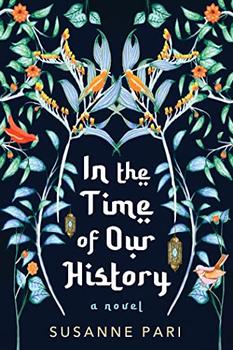Summary | Excerpt | Reading Guide | Reviews | Beyond the Book | Readalikes | Genres & Themes | Author Bio

It was Anahita who had begged to hear the stories Shireen had heard in childhood from her own mother and grandmothers. Tell me the andaruni stories, Anahita had pleaded, and though Shireen would sigh with exasperation because she had no time to engage in such frivolities, she was secretly delighted to talk about the days before Reza Shah forced men to bring their women out into the open unveiled. Shireen's family had been large and traditional, an established clan of textile manufacturers whose forebears had traded along the Silk Road, and who, when Shireen was a child, lived together in a compound behind ten-foot walls in the center of Tehran. Of the several buildings in the compound, one housed the women's quarters—called the andaruni, or inner chambers—where many women spent their whole lives, cloistered from the outside world. Surrounding them was the biruni—the outer chambers—which was the domain of men, including those who were trustworthy enough to act as liaisons between the outside and the inside. Shireen barely remembered this bifurcated world; in fact, soon after she was born, the andaruni became part of the main house, and by the time Shireen was a young girl, it had disappeared altogether. Her younger sister, Golnaz, couldn't imagine it. All that remained were two distinct parlors for entertaining female and male guests separately on the infrequent occasions when the elderly and old-fashioned came to visit. Still, an Iranian home carried the suggestion of the andaruni—its communal warmth, its safety, its collective industry—and these were as alluring to Shireen as the Hollywood films she saw in Tehran's movie theaters. And later, Anahita's fascination with that bygone era gave Shireen a connection with Iran that helped to soften her homesickness and her sense of otherness in America. Oh, the andaruni! Its floor strewn with intricate Isfahani carpets, its purring samovar lit with a flickering flame visible through a cloudy little window next to the spout, its neat piles of rolled mattresses against the walls. The doughy arms and breasts of its mothers and aunties, their rosewater scent and sibilant murmurings. The tangy aroma of slivered orange peel awaiting transformation into marmalade, the shoo-shoo sound of uncooked rice against a metal tray. Winter days gathered around a quilt-covered brazier, toes brushing calves, napping and waking like the tides. Games never played alone, kisses and food shared like secrets, herbs and tinctures prescribed for every ill, prayers offered for good fortune. Advice never from just one. Such a safe life! A hidden life untouched by strangeness. A sheltered freedom.
Shireen reached into the wicker laundry bin and collected a small bundle of dirty clothes: two pairs of Yusef's briefs, plaid pajamas, a sleeveless undershirt, four gold-toe black socks, her own underwear. Certainly not enough for a load, yet she took the bundle down to the basement laundry room, her backless slippers slap-slapping against her heels in the quiet house, and arranged the smelly light-colored fabrics evenly in the machine. Her nose was still leaking, and she dabbed at it daintily with the corner of a napkin she'd already ironed, then dropped it into the machine as well.
For a moment, she stood staring at the wall, mentally going over the long list of necessary tasks for the One Year gathering on Friday. The final shopping for fruits and vegetables could not be done until Friday, but everything else food-wise had been prepared; her freezer and refrigerator were stocked neatly with Tupperware containers of eggplant khoresh, lima bean and lamb polo, saffron rice pudding, dolmeh, Russian potato salad, green stuffed peppers, and two cheese casseroles. She'd cooked all this last week. The walls had been washed, the bathrooms disinfected, new shell-shaped soaps and scented candles purchased, the grout between the foyer tiles bleached with a toothbrush, the carpets vacuumed and fringes tucked under. She couldn't think of a thing that hadn't been done or that could be done just yet. She looked at her watch: 10:25. Time slithered like a snail.
Excerpted from In the Time of Our History by Susanne Pari. Copyright © 2023 by Susanne Pari. Excerpted by permission of Kensington Publishing. All rights reserved. No part of this excerpt may be reproduced or reprinted without permission in writing from the publisher.
Your guide toexceptional books
BookBrowse seeks out and recommends the best in contemporary fiction and nonfiction—books that not only engage and entertain but also deepen our understanding of ourselves and the world around us.